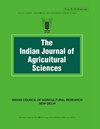行比和有机养分管理对芥菜+鹰嘴豆间作生产效益的影响
IF 0.7
4区 农林科学
Q4 AGRICULTURE, MULTIDISCIPLINARY
引用次数: 0
摘要
为探索印度芥菜(Brassica juncea (L.))最适行比种植制度和养分管理措施,于2021-22和2022-23冬季(rabi)季在新德里印度农业研究所研究农场进行了田间试验。Czern。鹰嘴豆(Cicer arietinum L.)间作制度。种植系统,如芥菜鳎;鹰嘴豆唯一;芥末+鹰嘴豆2:5;以芥菜+鹰嘴豆5:2为主要地块。营养管理措施,即控制;60 kg氮/公顷;20 kg农家肥+叶肥氮肥;以20 kg农家肥+叶肥+微生物群落为分样,以获得更高的精度。结果表明,单作芥菜和鹰嘴豆单作产量最高,但以芥菜当量产量计算,以芥菜+鹰嘴豆5:2行比间作产量最高。有机肥加微生物菌群(农家肥施氮20 kg +叶肥4 t/公顷+微生物菌群)组合处理的芥菜和鹰嘴豆产量最高。总收益、净收益和效益成本比均以芥菜+鹰嘴豆5:2行比最高。间作指标分析表明,有机肥和微生物菌群处理在芥菜+鹰嘴豆5:2行比下的间作优势最大。间作制度的土地等效比大于统一,具有优势。侵略性值表明芥菜作物优于鹰嘴豆作物。本文章由计算机程序翻译,如有差异,请以英文原文为准。
Effect of row ratios and organic nutrient management on productivity and economics of Indian mustard (Brassica juncea) + chickpea (Cicer arietinum) intercropping system
A field experiment was conducted during winter (rabi) seasons of 2021–22 and 2022–23 at the research farm of Indian Agricultural Research Institute, New Delhi to find out the suitable cropping system with optimum row ratio and nutrient management practice in Indian mustard [Brassica juncea (L.) Czern.] + chickpea (Cicer arietinum L.) intercropping system. Cropping systems i.e. mustard sole; chickpea sole; mustard + chickpea 2:5; mustard + chickpea 5:2 was taken as main plots. Nutrient management practices i.e. control; 60 kg Nitrogen/ha; 20 kg Nitrogen through farmyard manure + leaf manure; 20 kg Nitrogen through farmyard manure + leaf manure + microbial consortia were taken as sub-plots to attain a higher degree of precision. It was observed that though the crop yields of individual crops of mustard and chickpea were the highest in sole crop, but yield of intercropping system in terms of mustard equivalent yield was found to be the highest for mustard + chickpea 5:2 row ratio. Yields of both mustard and chickpea were observed to be the highest in the plots treated with combination of organic manures and microbial consortia i.e. 20 kg nitrogen through farmyard manure + leaf manure @4 t/ha + microbial consortia. Highest gross returns, net returns and benefit-cost ratio were found in mustard + chickpea 5:2 row ratio. Analysis of intercropping indices revealed the highest intercropping advantage in mustard + chickpea 5:2 row ratio when treated with organic manures and microbial consortia. Intercropping systems had land equivalent ratio more than unity, depicting advantage. Aggressivity values showed mustard crop was dominant over chickpea.
求助全文
通过发布文献求助,成功后即可免费获取论文全文。
去求助
来源期刊

Indian Journal of Agricultural Sciences
农林科学-农业综合
CiteScore
0.80
自引率
25.00%
发文量
273
审稿时长
6 months
期刊介绍:
The Indian Journal of Agricultural Sciences publishes papers concerned with the advancement of agriculture throughout the world. It publishes original scientific work related to strategic and applied studies in all aspects of agricultural science and exploited species, as well as reviews of scientific topics of current agricultural relevance.
Specific topics of interest include (but are not confined to): genetic resources, all aspects of crop improvement,crop production,crop protection, physiology, modeling of crop systems, the scientific underpinning of agronomy, engineering solutions, decision support systems, land use, environmental impacts of agriculture and forestry, impacts of climate change, rural biodiversity, experimental design and statistical analysis, the application of new analytical and study methods (including molecular studies) and agricultural economics. The journal also publishes book reviews.
Articles are accepted on the following broad disciplines:
Agric. Engineering & Technology, Agric. Social & Economic Sci., Agronomy, Biometry, Biosciences, Cytology, Ecology, Environmental Sciences, Fertilization, Forestry , Genetics, Horticultural Sciences, Microbiology, Pest, Weed Control etc., Molecular Biology, Plant Pathology, Plant Breeding, Physiology and Biochemistry, Soil Sciences, Special Cultivation Technology, Stress Breeding, Agric. extension, and Cell Biology.
 求助内容:
求助内容: 应助结果提醒方式:
应助结果提醒方式:


